
Sofia is the capital and largest city of Bulgaria. It is situated in the Sofia Valley at the foot of the Vitosha mountain, in the western part of the country. The city is built west of the Iskar river and has many mineral springs, such as the Sofia Central Mineral Baths. It has a humid continental climate. Being in the centre of the Balkans, it is midway between the Black Sea and the Adriatic Sea and closest to the Aegean Sea.
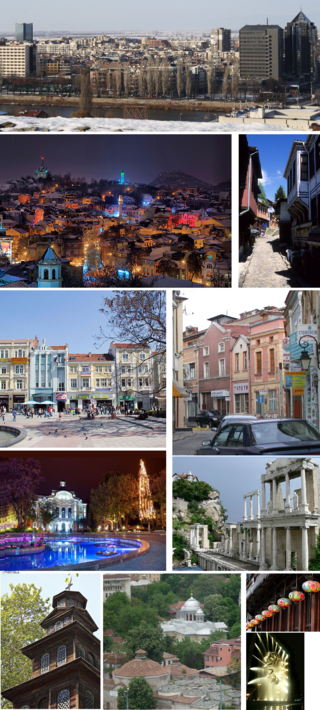
Plovdiv is the second-largest city in Bulgaria, 93 miles southeast of the capital Sofia. It had a population of 371 536 as of 2024 and 675,000 in the greater metropolitan area. Plovdiv is a cultural hub in Bulgaria and was the European Capital of Culture in 1999 and 2019. The city is an important economic, transport, cultural, and educational centre. Plovdiv joined the UNESCO Global Network of Learning Cities in 2016.

A number of ancient civilizations, including the Thracians, ancient Greeks, Scythians, Celts, ancient Romans, Goths, Slavs, Varangians and the Bulgars have left their mark on the culture, history and heritage of Bulgaria. Due to this great variety of influences, Bulgaria has adopted many unusual traditions. Thracian artifacts include numerous temples, tombs, golden treasures and ancient rites and rituals, while the Bulgars have left traces of their heritage in statehood, early architecture, music and dances. Thracian rituals such as the Tryphon Zarezan which is dedicated to Saint Tryphon of Campsada, Kukeri and Martenitsa are to this day kept alive in the modern Bulgarian culture. The oldest treasure of worked gold in the world, dating back to the 5th millennium BC, comes from the site of the Varna Necropolis.
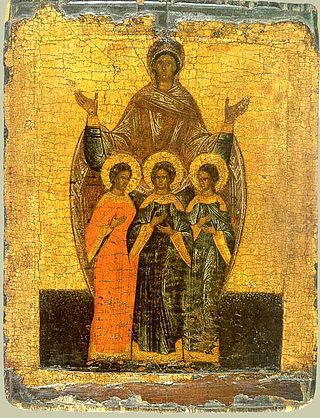
Saints Faith, Hope, and Charity , are a group of Christian martyred saints who are venerated together with their mother, Sophia ("Wisdom").

Sofia Airport is the main international airport of Bulgaria, located 10 km (6.2 mi) east of the centre of the capital Sofia. In 2019 the airport surpassed 7 million passengers for the first time. The airport serves as the home base for BH Air, Bulgaria Air, European Air Charter and GullivAir, and as a base for both Ryanair and Wizz Air. The airport also houses the Bulgarian Air Force's Vrazhdebna Air Base.

Sophia is a central idea in Hellenistic philosophy and religion, Platonism, Gnosticism and Christian theology. Originally carrying a meaning of "cleverness, skill", the later meaning of the term, close to the meaning of phronesis, was significantly shaped by the term philosophía as used by Plato.

The Church of Saint George is a Late Antique red brick rotunda in Sofia, Bulgaria. Built in the early 4th century as Roman baths, it became a church inside the walls of Serdica, capital of ancient Dacia Mediterranea during the Roman Empire and Byzantine Empire. The Early Christian church is considered the oldest building in modern Sofia and belongs to the Bulgarian Orthodox Church.

The Saint Sofia Church is the oldest church in the Bulgarian capital Sofia, dating to the fourth century. In the predecessor building took place the Council of Serdica held most probably in 343 and attended by 316 bishops. In the 14th century, the church gave its name to the city, previously known as Serdika (Сердика).
The history of Sofia, Bulgaria's capital and largest city, spans thousands of years from Antiquity to modern times, during which the city has been a commercial, industrial, cultural and economic centre in its region and the Balkans.

The Central Mineral Baths is a landmark in the city center of Sofia, the capital of Bulgaria, a city known for the mineral springs in the area. It was built in the early 20th century near the former Turkish bath and was used as the city's public baths until 1986.

Holy Wisdom is a concept in Christian theology.

The Eternal derby of Bulgarian football or simply The Eternal derby is the name of the local derby football match between the two most popular and successful football clubs in Sofia and Bulgaria: Levski Sofia and CSKA Sofia. The dominant forces in Bulgarian football have won 26 and 31 national championship titles and 26 and 21 Bulgarian Cup titles, involved into 13 and 11 Doubles, respectively. The rivalry was chosen by COPA90 as the 2nd Maddest Derby in Eastern Europe.

Dragalevtsi Monastery of the Holy Mother of God of Vitosha is a Bulgarian Orthodox monastery on the lower slopes of Vitosha mountain on the outskirts of the capital Sofia in western Bulgaria. Founded in the mid-14th century by Bulgarian tsar Ivan Alexander, the monastery was abandoned after the Ottoman conquest of Sofia and reestablished in the late 15th century, when it became an important literary centre. The monastery church and some of its frescoes date from this period.
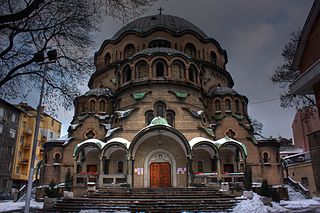
The Church of St Paraskeva is a Bulgarian Orthodox church in Sofia, the capital of Bulgaria. The church, dedicated to Saint Paraskeva, is located on 58 Georgi Rakovski Street in the centre of the city. It is the third-largest church in Sofia.
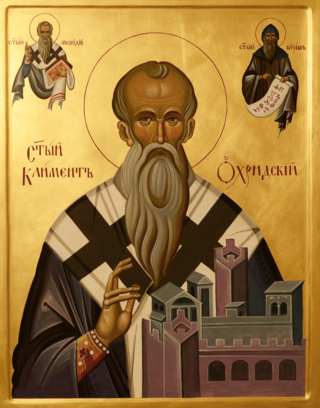
Clement or Kliment of Ohrid was one of the first medieval Bulgarian saints, scholar, writer, and apostle to the Slavs. He was one of the most prominent disciples of Cyril and Methodius and is often associated with the creation of the Glagolitic and Cyrillic scripts, especially their popularisation among Christianised Slavs. He was the founder of the Ohrid Literary School and is regarded as a patron of education and language by some Slavic people. He is considered to be the first bishop of the Bulgarian Orthodox Church, one of the Seven Apostles of Bulgarian Orthodox Church since the 10th century, and one of the premier saints of modern Bulgaria. The mission of Clement was the crucial factor which transformed the Slavs in then Kutmichevitsa into Bulgarians. Clement is also the patron saint of North Macedonia, the city of Ohrid and the Macedonian Orthodox Church.
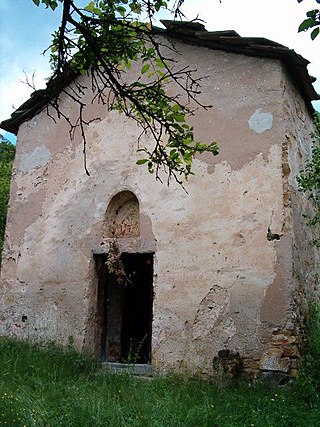
Berende is a village in Dragoman Municipality, Sofia Province, in the westernmost part of Bulgaria near the border with Serbia.
Saint Sophia Church may refer to:

The 2020 Bulgarian Cup final was the final match of the 2019–20 Bulgarian Cup and the 80th final of the Bulgarian Cup. The final took place on 1 July 2020 at Vasil Levski National Stadium, Sofia, Bulgaria. On 27 June the Bulgarian Football Union announced that it is allowed for the stadium to host up to 30% of its total capacity with up to 3,000 spectators per block in accordance with the health regulations issued by the Ministry of Health in relation to the ongoing COVID-19 pandemic in Bulgaria.















